
The Compact Cassette or Musicassette (MC), also commonly called the tape cassette, cassette tape, audio cassette, or simply tape or cassette, is an analog magnetic tape recording format for audio recording and playback. Invented by Lou Ottens and his team at the Dutch company Philips in 1963, Compact Cassettes come in two forms, either already containing content as a prerecorded cassette (Musicassette), or as a fully recordable "blank" cassette. Both forms have two sides and are reversible by the user. Although other tape cassette formats have also existed - for example the Microcassette - the generic term cassette tape is normally always used to refer to the Compact Cassette because of its ubiquity.
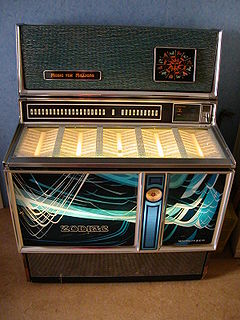
A jukebox is a partially automated music-playing device, usually a coin-operated machine, that will play a patron's selection from self-contained media. The classic jukebox has buttons, with letters and numbers on them, which are used to select a specific record. Some may use compact discs instead. Disc changers are similar devices that are intended for home use, are small enough to fit in a shelf, may hold up to hundreds of discs, and allow discs to be easily removed, replaced, and inserted by the user.

A CD player is an electronic device that plays audio compact discs, which are a digital optical disc data storage format. CD players were first sold to consumers in 1982. CDs typically contain recordings of audio material such as music or audiobooks. CD players may be part of home stereo systems, car audio systems, personal computers, or portable CD players such as CD boomboxes. Most CD players produce an output signal via a headphone jack or RCA jacks. To use a CD player in a home stereo system, the user connects an RCA cable from the RCA jacks to a hi-fi and loudspeakers for listening to music. To listen to music using a CD player with a headphone output jack, the user plugs headphones or earphones into the headphone jack.
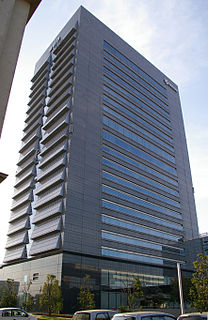
Kyocera Corporation is a Japanese multinational ceramics and electronics manufacturer headquartered in Kyoto, Japan. It was founded as Kyoto Ceramic Company, Limited in 1959 by Kazuo Inamori and renamed in 1982. It manufactures industrial ceramics, solar power generating systems, telecommunications equipment, office document imaging equipment, electronic components, semiconductor packages, cutting tools, and components for medical and dental implant systems.
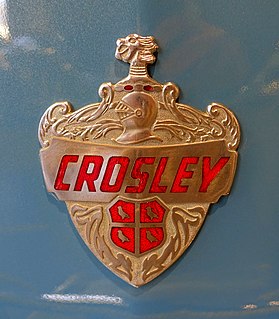
Crosley was a small, independent American manufacturer of subcompact cars, bordering on microcars. At first called the Crosley Corporation and later Crosley Motors Incorporated, the Cincinnati, Ohio, firm was active from 1939 to 1952, interrupted by World War II production. Their station wagons were the most popular model, but also offered were sedans, pickups, convertibles, a sports car, and even a tiny jeep-like vehicle. For export, the cars were badged Crosmobile.
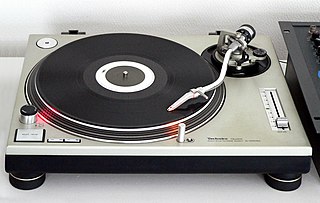
Technics SL-1200 is a series of direct-drive turntables originally manufactured from October 1972 until 2010, and resumed in 2016, by Matsushita Electric under the brand name of Technics. S means "Stereo", L means "Player". Originally released as a high fidelity consumer record player, it quickly became adopted among radio and disco club disc jockeys, thanks to the direct drive, high torque motor design, making it initially suitable for pushbutton cueing and starting of tracks on radio and in dance clubs. It is still extremely popular with audiophiles.

Novation Digital Music Systems Ltd. is a British musical equipment manufacturer, founded in 1992 by Ian Jannaway and Mark Thompson as Novation Electronic Music Systems. Today the company specializes in MIDI controllers with and without keyboards, both analog and virtual analog performance synthesizers, grid-based performance controllers, and audio interfaces. At present, Novation products are primarily manufactured in China.
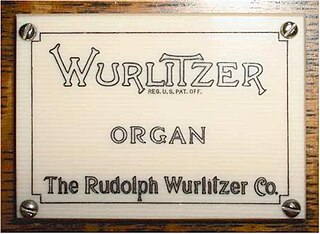
The Rudolph Wurlitzer Company, usually referred to as simply Wurlitzer, is an American company started in Cincinnati in 1853 by German immigrant (Franz) Rudolph Wurlitzer. The company initially imported stringed, woodwind and brass instruments from Germany for resale in the United States. Wurlitzer enjoyed initial success, largely due to defense contracts to provide musical instruments to the U.S. military. In 1880, the company began manufacturing pianos and eventually relocated to North Tonawanda, New York. It quickly expanded to make band organs, orchestrions, player pianos and pipe or theatre organs popular in theatres during the days of silent movies.

Vestax Corporation was a Japanese musical instrument, turntable and audio equipment firm founded by Hidesato Shiino in 1977. The company started by designing and manufacturing electronic guitars. In the 1980s, Vestax produced multitrack recorders and later moved to making DJ mixers, professional turntables, compact disc players and signal processors. Debt troubles led to the company's bankruptcy at the end of 2014.
Seeburg was an American design and manufacturing company of automated musical equipment, such as orchestrions, jukeboxes, and vending equipment. Prior to manufacturing their signature jukebox suite of products, Seeburg was considered to be one of the "big four" of the top coin-operated phonograph companies alongside AMI, Wurlitzer, and Rock-Ola. At the height of jukebox popularity, Seeburg machines were synonymous with the technology and a major quotidian brand of American teenage life. The company went out of business after being sold to Stern Electronics in 1982.

A CDJ is a specialized digital music player for DJing. Originally designed to play music from compact discs, many CDJs can play digital music files stored on USB flash drives or SD cards. In typical use, at least two CDJs are plugged into a DJ mixer. CDJs have jog wheels and pitch faders that allow manipulation of the digital music file similar to a vinyl record on a DJ turntable. Many have additional features such as loops and beat analysis that are not present on turntables. Additionally, some can function as DJ controllers to control the playback of digital files in DJ software running on a laptop instead of playing the files on the CDJ.

The Rock-Ola Manufacturing Corporation is an American developer and manufacturer of juke boxes and related machinery. It was founded in 1927 by Coin-Op pioneer David Cullen Rockola to manufacture slot machines, scales, and pinball machines. The firm later produced parking meters, furniture, arcade video games, and firearms, but became best known for its jukeboxes.

Dover Corporation is an American conglomerate manufacturer of industrial products. The Downers Grove, Illinois-based company was founded in 1955. As of 2021, Dover's business was divided into five segments: Engineered Products, Clean Energy and Fueling, Imaging & Identification, Pumps & Process Solutions and Climate and Sustainability Technologies. Dover is a constituent of the S&P 500 index and trades on the New York Stock Exchange under "DOV". Dover was ranked 433rd in the 2022 Fortune 500. The company relocated its headquarters to Illinois from New York in mid-2010.
Radford Electronics is a British audio manufacturer from Bristol, founded by Arthur Hedley Radford in 1946. Radford's hi-fi amplifiers enjoyed a reputation for quality that was "second to none", especially because of their output transformers.
Cambridge Audio is a British manufacturer of high-end audio equipment. As the name suggests, it has its origins in Cambridge, England, where in the early 1960s a group of young technology graduates established a high-technology R&D and prototyping business: Cambridge Consultants.
Technics is a Japanese brand name of the Panasonic Corporation for audio equipment. Since 1965 under the brand name, Panasonic has produced a variety of hi-fi products, such as turntables, amplifiers, receivers, tape decks, CD players and speakers for sale in various countries. It was conceived as a line of high-end audio equipment to compete against brands such as Nakamichi.

OMNOVA Solutions Inc., is a global manufacturer of emulsion polymers, specialty chemicals, and functional and decorative surfaces. OMNOVA was founded in 1999 when GenCorp spun off its Decorative & Building Products and Performance Chemicals businesses into a separate, publicly traded company. OMNOVA's world headquarters is located in Beachwood, Ohio with additional sales, manufacturing and distribution locations throughout Europe and Asia.
Eyetech Group Ltd is a company founded in 1983, in order to provide commercial companies with automatical data collection systems. They had already been involved in the provision of the automatic toll collection systems used at the Dartford River Crossing, as well as many of the bar code based tracking systems used by UK national parcel service.
David Richardson is an English music producer, audio engineer and musician. He founded Sky Studios with rock band Jethro Tull, the studio later became leading facilities house, Sound Recording Technology (SRT).

Crosley Radio is an audio electronic manufacturing company headquartered in Louisville, Kentucky. The current CEO is Bo LeMastus. It is a modern incarnation of the original Crosley Corporation which existed from 1921 to 1956. Modern Marketing Concepts resurrected the Crosley name after the original brand was discontinued by parent company Avco in 1956, due to declining sales. The modern Crosley first marketed turntables in 1992. Today, Crosley is one of the country's leading marketers of turntables, as well as radios and jukeboxes.













